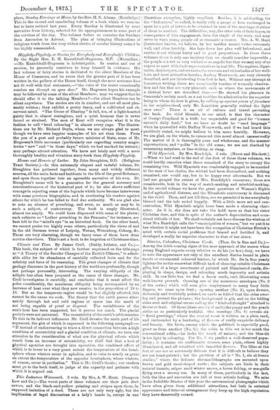Climate and Time. By James Croll. (Daldy, Isbister, and Co.)—
This book, the subject of which is further expressed on the title-page as "A Theory of the Secular Changes of the Earth's Climate," is admir- able alike for its abundance of carefully collected facts and for the sobriety and force of its reasoning. Th-o great changes of climate that geology discovers in the past history of the world are profoundly, though not perhaps personally, interesting. The varying obliquity of the ecliptic has often been proposed as the cause of these changes. Mr. Croll investigates it carefully, and concludes that it must affect the poles considerably, the maximum obliquity being accompanied by an increase of heat over what they now receive in the proportion of 19 to 18. But as the temperate region would be but slightly affected, this cannot be the cause we seek. The theory that the earth passes alter- nately through hot and cold regions of space has the merit of not being capable of proof or disproof. The variableness of the sun's heat has been suggested, but it proves too much. The glacial periods were not universal. The eccentricity of the earth's orbit remains. To this in its indirect influences Mr. Croll devotes the main part of his argument, the gist of which is expressed in the following paragraph :— " If instead of endeavouring to trace a direct connection between a high condition of eccentricity and a glacial condition of climate, we turn our attention to the consideration of what are the physical effects which result from an increase of eccentricity, we shall find that a host of Rhysical agencies are brought into operation, the combined effect of which is to lower to a very great extent the temperature of the hemi- sphere whose winters occur in aphelion, and to raise to nearly as great an extent the temperature of the opposite hemisphere, whose winters, of course, occur in perihelion." This is Mr. Croll's thesis ; our readers must go to the book itself, to judge of the capacity and patience with which it is argued out.






































 Previous page
Previous page